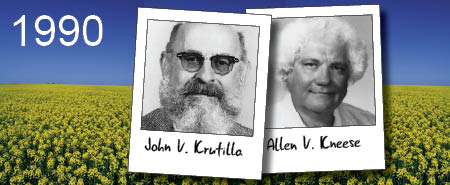 Paul R. Ehrlich is Bing Professor of Population Studies and professor of biology at Stanford University and a fellow of the Beijer Institute of Ecological Economics. Starting in the mid 1960s, Ehrlich has been a very productive author of professional papers and popular articles on different aspects on humankind’s environmental predicament.
Paul R. Ehrlich is Bing Professor of Population Studies and professor of biology at Stanford University and a fellow of the Beijer Institute of Ecological Economics. Starting in the mid 1960s, Ehrlich has been a very productive author of professional papers and popular articles on different aspects on humankind’s environmental predicament.
Ehrlich has been tireless in presenting both to the scientific world and to the general public and politicians his well-founded concern for our common future. He has worked through popular presentations, scientific papers, and hundreds of lectures. He has focused on questions of environmental degradation, natural resource limitations, population growth, and development processes, especially highlighting the interface between scientific enquiry and societal values. He has taken the environmental cause into the wider public sphere through frequent appearances on television and radio. He is also an active leader in a number of non-governmental organizations and citizen groups.
The Bomb
His well-known book “The Population Bomb” from 1968 has sold more than 3 million copies and been translated into several languages. The concept of the book was that the excessive population growth is inseparably connected with natural resource depletion and environmental degradation. These are three interlinked problems that can only be confronted together. In 1968, this was a very radical idea.
In the book he predicted that “In the 1970s and 1980s . . . hundreds of millions of people are going to starve to death in spite of any crash programs embarked upon now.”
The Popular Explosion: This sequel to Paul Ehrlich’s 1968 landmark best-seller The Population Bomb examines the critical choices we face today and proposes an agenda for the 1990s to avoid global ecocide. The Population Explosion vividly describes how the Earth’s population, growing by 95 million people a year, is rapidly depleting the planet’s resources, resulting in famine, global warming, acid rain, and other major problems.
The Dominant Animal: In 2008 Paul and Anne Ehrlich publiched “The Dominant Animal” that explores why we are creating a world that threatens our own species and what we can we do to change the current trajectory toward more climate change, increased famine, and epidemic disease.
http://www.dominantanimal.org/
Ehrlich has been frequently criticized for venturing into professional fields other than that of his background training, and his research findings have been hotly contested by his professional peers on numerous occasions. But his conclusions have been confirmed through experience until they have become part of mainstream scientific thinking. For instance, The Population Bomb was roundly criticized at the U.N. population conference in Bucharest in 1974, but its message was broadly accepted at the next population conference in Mexico City 10 years later.
Paul Ehrich Blogg:
http://blog.islandpress.org/author/paulehrlich



